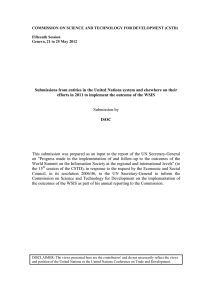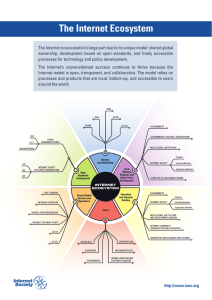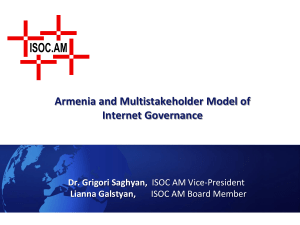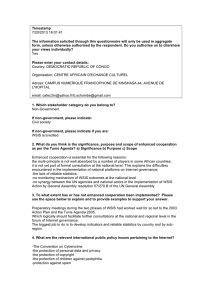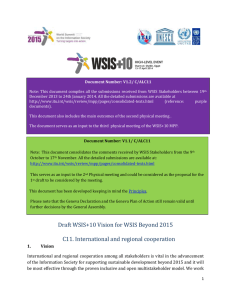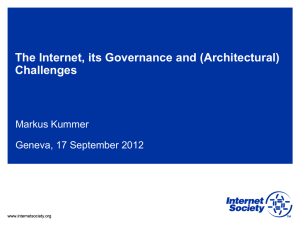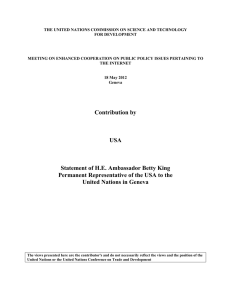Document 10395198
advertisement
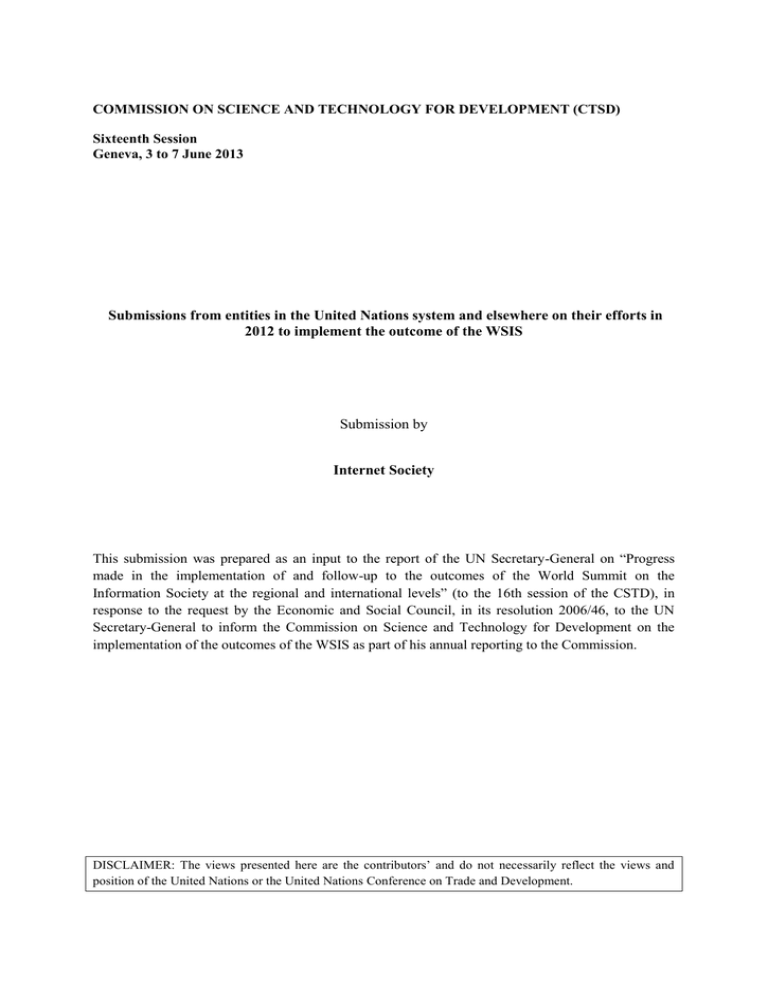
COMMISSION ON SCIENCE AND TECHNOLOGY FOR DEVELOPMENT (CTSD) Sixteenth Session Geneva, 3 to 7 June 2013 Submissions from entities in the United Nations system and elsewhere on their efforts in 2012 to implement the outcome of the WSIS Submission by Internet Society This submission was prepared as an input to the report of the UN Secretary-General on “Progress made in the implementation of and follow-up to the outcomes of the World Summit on the Information Society at the regional and international levels” (to the 16th session of the CSTD), in response to the request by the Economic and Social Council, in its resolution 2006/46, to the UN Secretary-General to inform the Commission on Science and Technology for Development on the implementation of the outcomes of the WSIS as part of his annual reporting to the Commission. DISCLAIMER: The views presented here are the contributors’ and do not necessarily reflect the views and position of the United Nations or the United Nations Conference on Trade and Development. UNITED NATIONS COMMISSION ON SCIENCE AND TECHNOLOGY FOR DEVELOPMENT (CSTD) SUMMARY OF ACTIVITIES UNDERTAKEN BY THE INTERNET SOCIETY RELATED TO THE IMPLEMENTATION OF THE TARGETS, RECOMMENDATIONS AND COMMITMENTS OF THE WORLD SUMMIT ON THE INFORMATION SOCIETY INTRODUCTION The Internet Society is a nonprofit organization founded in 1992. It is the world’s trusted independent source of leadership for Internet policy, technology standards and future development. Based on its principled vision and substantial technological foundation, the Internet Society works with its members and Chapters around the world to promote the continued evolution and growth of the open Internet through dialog among companies, governments, and other organizations around the world. The Internet Society acts as a global clearinghouse for Internet information and capacity building and as a facilitator and coordinator of Internet-related initiatives around the world. For 20 years ISOC has run international network training programs for developing countries and these have played a vital role in setting up the Internet connections and networks in virtually every country connecting to the Internet during this time. With more than 50,000 individual members and over 100 organizational members, the Internet Society represents a global network of corporations, nonprofit associations, and people. ISOC has regional bureaus to better serve the regional Internet community. The Latin American and Caribbean bureau is located in Buenos Aires, Argentina, the African bureau in Addis Ababa, Ethiopia, the European Bureau in Brussels, Belgium, the South and Southeast Asian bureau in Singapore, and the North American bureau is located in Reston, Virginia, USA. Through its sponsored events, developing-country training workshops, tutorials, public policy, and regional and local chapters, the Internet Society serves the needs of the growing global Internet community. From commerce to education to social issues, our goal is to enhance the availability and utility of the Internet on the widest possible scale. The Internet Society was accredited to the WSIS during its first phase and participated actively in the entire preparatory process and in the Geneva and Tunis Summits themselves. Since the Tunis Summit, the Internet Society has been actively involved in support of implementing the targets, recommendations, and commitments of the WSIS as they pertain to the Internet, and to Internet Governance. This brief report provides a summary of ISOC’s activities, and the lessons learned from our experience. INTERNET GOVERNANCE Building on our past contributions to the WSIS and the Internet Governance Forum (IGF), the Internet Society has this year again been an active participant of IGF 7 (5-9 November, Baku Azerbaijan). The Internet Society and its community of members recognize the Internet Governance Forum as one of the most successful outcomes of the WSIS. As an organization ISOC has contributed financially to the operation of the IGF, has participated in the Multi-stakeholder Advisory Group (MAG) to the Secretary-General, and assisted MAG members from developing countries to participate. ISOC has organized workshops at the IGF and worked with all other stakeholders to make the IGF a success. 1 There are many benefits of sharing information and building capacity through the IGF. As an example, the Internet Society collaborated with the International Federation of Library Associations and Institutions (IFLA) and Electronic Information for Libraries (EIFL) to conduct a workshop at the IGF on Digital Inclusion and Public Access to the Internet: “What Policymakers Need and how Libraries and Other Community Services can Deliver”, highlighting the vital role these services provide in local communities. In partnership with the Civil Society (APC) and the Business community (ICC Basis), the Internet Society also co-organized a discussion on Enhanced Cooperation in Internet Governance, enabling a frank and constructive discussion among all stakeholders. ISOC has also actively contributed to critical discussions such as Human Rights, Privacy, Intellectual Property Rights and Capacity Building, where is appeared that the format of the IGF was ideal to enable open, inclusive and constructive discussions. As the Internet community kick-starts preparations for the WSIS+10 Review where the debate will continue, we are committed to preserving this collective and collaborative approach. In 2012, ISOC also sponsored 17 IGF “Ambassadors”, through its Next Generation Leaders programme, bringing qualified young participants to the IGF from around the world and from all stakeholder groups to learn and to teach about Internet governance. Our selection of Ambassadors this year came from governments, academic institutions, businesses, and civil society. ISOC believes the value of the IGF is its ability to bring together people who might not meet otherwise. The complete list and more information on ISOC’s IGF 7 ISOC activities is available here: http://www.internetsociety.org/igf/2012-internet-governance-forum/igf-2012-activities-list Finally, in association with our regional bureaus in Africa, the Asia-Pacific, Europe, Latin America and the Caribbean, and North America, ISOC is also involved in facilitating, participating in and sponsoring local and regional Internet Governance Forums (IGFs) across the globe. WSIS ACTION LINES The Internet Society also works with all other stakeholders in ways that contribute to the implementation of several of the WSIS Action Lines, such as the following. C.1: The Role of Public Governance Authorities and All Stakeholders in the Promotion of ICTs for Development, and C.11: International and Regional Cooperation From the perspective of a non-governmental organization such as ISOC, there can be no doubt that the innovations and openness that the WSIS brought to all the stakeholders involved is one of its most important achievements. The WSIS has contributed greatly to awareness of the importance of the multi-stakeholder approach in achieving good public governance. In pursuing our public policy objectives, ISOC operates collaboratively and inclusively, working with governments, national and international organizations, civil society, academia, the private sector and other parties to reach decisions about the Internet that conform to our core values. Since the WSIS, ISOC has expanded collaboration with intergovernmental organizations, including such examples as the Organisation for Economic Cooperation and Development (OECD), the Council of Europe, the African Union, AsiaPacific Economic Cooperation (APEC), World Intellectual Property Organization (WIPO), the Organization of American States/Inter-American Telecommunication Commission (CITEL), and with national governments to promote the expansion of the Internet around the world: http://www.internetsociety.org/who-we-are/our-community-and-partners. One concrete example of expanded international cooperation is ISOC’s participation in the Internet Technical Advisory Committee (ITAC) of the OECD’s Information, Computer and Communication Policy Committee (ICCP). This new body was created in 2008 to provide information and expert advice to assist and improve the public policy process addressing a wide range of topics, such as information security and privacy, critical infrastructures (such as IPv6), Internet economy and 2 innovation issues. In 2012, ITAC had the opportunity to organize its second face-to-face-meeting, including sessions to discuss with OECD senior staff and representatives of other stakeholders groups (Business and Civil Society) the OECD’s work-plan for 2013-2014. ITAC has become an attractive Committee and has again recruited several new members the past year, which demonstrates the benefits to all stakeholders that come about from enhanced cooperation among them. C2. Information and Communication Infrastructure Facilitating Internet Standards Development: As the organizational home for the groups responsible for Internet infrastructure standards, including the Internet Engineering Task Force (IETF) and the Internet Architecture Board (IAB), the Internet Engineering Steering Group (IESG), and the Internet Research Task Force (IRTF), the Internet Society is deeply involved in the development of Internet standards and technology. These are the standards setting and research arms of the Internet community. These are open organizations, relying on transparent, bottom-up processes to build consensus. Thousands of people from around the world participate in the process and the standards they develop are free and accessible to everyone. ISOC also works with other technical organizations, such as the International Telecommunication Union (ITU) and the World Wide Web Consortium (W3C) to support and enhance existing standards efforts, promote coordination between them, to identify gaps and ways to fill them, and to maximize the usability of open standards. The WSIS has recognized the vital role played by open standards in the development of ICTs, and our work with all interested stakeholders forms a second major contribution that ISOC has played in implementing the WSIS commitments. Building Local and Regional Internet Infrastructure: ISOC simultaneously works to build capacity by engaging in targeted regional and local projects that improve Internet infrastructure, and impact economic growth. For example, ISOC has undertaken comprehensive projects in Africa and Latin America and the Caribbean to improve the Internet interconnection and traffic exchange landscapes. These projects have helped launch and/or improve Internet Exchange Points (IXPs) in countries where they have not yet been established, or where countries are seeking to advance their operations. The work encompasses a range of activities, from technical training workshops, operational and implementation guidance, to assistance in local stakeholder coordination efforts, and information for policymakers and regulators about the role of IXPs and related interconnection and traffic exchange issues. In 2012, ISOC collaborated with local and Internet community stakeholders to facilitate discussions about IXP creation, launch and/or enhance national IXP infrastructures, and provide technical training in Argentina, the Democratic Republic of Congo, Costa Rica, Curacao, El Salvador (with Packet Clearing House), Guatemala, Lesotho, Malawi, Paraguay, Sierra Leone, Tanzania, Trinidad and Tobago, and Zambia. We held our third African Peering and Interconnection Forum (AfPIF) (http://www.internetsociety.org/events/afpif) in 2012. These events assist African stakeholders by addressing key peering and Interconnection opportunities and discussing connectivity challenges on the continent. They also facilitate sharing of global and local strategies for lowering interconnection and traffic exchange costs, and connect key experts and engineers with each other. ISOC worked with LACNIC and other Internet community partners in Latin America and the Caribbean to facilitate the launch of LAC-IX, an association of IXP operations. Promoting Studies on Interconnection: The Internet Society is also collaborating with the OECD on the development of a study on “Internet Cables, Gateways, Backhaul and IXPs” as well as a continuing project with the OECD and the United Nations Educational, Scientific and Cultural Organization (UNESCO) on the "Relationship between Local Content, Internet Development and Access Prices”. The later study focuses on the positive inter-linkages between higher levels of local digital content creation and better Internet connectivity. Its main findings and conclusions were recognized a formal contribution to the African Union’s 2012 Ministerial meeting: http://www.unesco.org/new/fileadmin/MULTIMEDIA/HQ/CI/CI/pdf/news/local_content_study.pdf> 3 C4. Capacity Building The Internet Society devotes significant resources to initiatives aimed at capacity building. These efforts focus on human, governance, technical, and policy infrastructure capacity building, select infrastructure enhancement projects, and enabling access for underserved communities. For the Internet to grow and be sustainable, network operators need the technical capacity necessary to build, innovate, maintain, and protect networks. Given that Internet technology changes rapidly, capacity building is an ongoing process and local information-sharing mechanisms must be in place to sustain knowledge transfer beyond classroom-based training exercises. ISOC’s technical capacity-building programmes aim to train network engineers and operators in basic and advanced internetworking skills and techniques, to build regional and functional operator communities that can maximize knowledge, experience, skills transfer, and problem solving, and to foster technical leadership within communities that sustain and advance local capacity and more fully participate in regional and global Internet technical and governance forums. As part of these efforts, ISOC has undertaken a range of capacity building training workshops, events, and seminars around the world, with a specific emphasis on developing countries and emerging economies. ISOC often undertakes these partnership activities with other Internet community organizations and Internet technical experts. Training Experts: We place significant emphasis on organizing, supporting, and participating in hands-on technical training events for Internet engineers, peering coordinators, and network managers. For example, ISOC hosts training events and workshops on a range of network development and operational skills, including network administration and monitoring, bandwidth and critical resource management, advanced routing (IPv4/IPv6), wireless networking, and Internet services, among other topics in various in-country locations from Latin America and the Caribbean, Africa, and Asia. ISOC also works with Internet community colleagues such as AfriNIC, AfNOG, APNIC, the CTU, LACNIC, Packet Clearing House, and RIPE-NCC, to conduct regional technical training events. For example, ISOC co-sponsors AfCHIX training with AfriNIC during AfNOG meetings. AfCHIX workshops are specifically aimed at women Internet engineers in Africa. ISOC also sponsors a variety of other network operator group meetings: the Middle East Network Operators Group (MENOG), the South Asian Network Operators Group (SANOG), and the Workshop on Internet Networks Technologies for Latin America and the Caribbean (WALC). Through close collaboration with experts from the Internet Engineering Task Force (IETF) we bring government policy experts from around the world to IETF meetings, and provide a week of Internet policy and technical infrastructure awareness sessions with global Internet and policy experts. In 2012, we hosted seventeen IETF policy experts from Cameroon, Cote D’Ivoire, Guatemala, Kenya, Lesotho, Nigeria, Papua New Guinea, The Philippines, Senegal, St. Lucia, Thailand, Trinidad and Tobago, and the European Commission. Through our direct training and partnership projects, ISOC reaches some 700+ emerging economy and developing country engineers and policy experts per year with vital skills and knowledge that supports Internet growth and development. Governance capacity building also is conducted through our efforts to educate governments, experts, and stakeholders about the importance of a community-based bottom-approach with respect to maintaining and managing IXPs. Community and Local Projects: ISOC maintains a Community Grants programme, and works with local communities and experts across the globe on practical projects that bring Internet connectivity and training to communities that lack sufficient Internet access. These efforts also strive to empower human potential. Our Community Grants programme specifically aims to strengthen local human, technical and governance capacities: http://www.internetsociety.org/what-we-do/grantsawards/community-grants. Recent projects include computer training for primary school teachers in Mali – some for the first time, building greatly needed technical infrastructure at a rural all-girls school in Nigeria, providing solar-computer-Lab-in-a-box and solar long-distance WiFi set-ups to a rural island school in Udot within Chuuk, the Federated States of Micronesia, up-grading an IXP in 4 Uganda to enhance scalability and provide greater stability to its peers, assisting in the creation of an IXP in Palestine, facilitation of an e-learning system in the Republic of Georgia to help develop distance education tools, bridging the digital divide in Bangalore through a digital literacy and ebusiness education programme for artisans, providing support to Armenia’s Academic Scientific Research Computer Network to enable IPv6 deployment at both the hardware and software level, assisting an Internet governance and education programme in Benin, and facilitating Internet access for women and girls in the Democratic Republic of the Congo. These projects take advantage of the diversity of expertise within ISOC’s own membership, including our world-wide network of 90+ local Chapters, and encourages them to work with stakeholders in their local communities. Combined with our regional bureau activities, these community and local projects support vital community-based capacity building, and ICT4D innovation work in developing and emerging economies around the world. Internet Leadership: Last but not least, ISOC’s Next Generation Leaders programme enables Internet professionals between the ages of 20 and 40 to develop their leadership potential where technology, business, policy, and education intersect. The curriculum includes fellowships to major Internet events (such as the IETF, IGF, the OECD, and the World Bank’s infoDev Global Forum) as well as an eLearning programme delivered with our partner the DiploFoundation: http://www.internetsociety.org/node/9387 C.10: Ethical Dimensions of the Information Society In early 2011, popular movements in North Africa and the Middle East raised global awareness around the instrumental role that the Internet can play in voicing citizen’s aspirations for freedom and change. In 2012, the intersection between the Internet and Human Rights was once again a timely issue and the center of much attention by the diverse actors of the Internet Ecosystem, including the Internet Society. As part of its efforts regarding the ethical dimension of the Information Society, ISOC focused its engagement on the role of the Internet technical community in contributing to a rights fostering network, namely through the open and multistakeholder processes of Internet technical and policy development. At the core of the Internet lies its fundamental architecture – open, decentralized, distributed and end-to-end – which empowers users on the margins of the network. The open Internet model means that anyone can build upon the work of those that went before them; this generative nature enables innovation at the edges, without the need to ask for permission at the center. Reflecting on this dimension, the Internet Society has collaborated with civil society to produce a concept paper that looks specifically at the fundamental processes that make the Internet a success, its standards development processes and other key protocols, and how they are aligned with the processes by which Human Rights standards are developed. (http://www.internetsociety.org/doc/human-rights-and-internet-protocols-comparing-processes-andprinciples) This paper is one of the many initiatives undertaken by ISOC to foster more collaboration and shared understanding across different stakeholder groups – policy makers, business, civil society and the Internet technical community - on Human Rights issues. The Internet Society participated in all United Nations Human Rights Council sessions, with a focus on issues related to freedom of expression, freedom of association, as well as hate speech. In particular, ISOC took the opportunity to actively participate in the working group sessions that led to the adoption of the widely publicized Human Rights Council’s Resolution on the “Promotion, Protection and Enjoyment of Human Rights on the Internet” (Resolution L13). Additionally, ISOC 5 participated in an adjacent event organized by the Council of Europe on “The Right to Protection of Personal Data in the Digital Era”. On International Human Rights Day (10 December 2012), the Internet Society engaged with its broader community around the Day’s theme, on inclusion and the right to participate in public life, focusing more specifically on the impact of the Internet and ICTs in shaping societies to the aspirations of their constituents. This engagement raised interest around notions such as accessibility, digital literacy, public access, e-government initiatives or open Internet standards. (http://www.internetsociety.org/humanrights/human-rights-day-your-voice-counts) Earlier during the year, on May 3, the Internet Society also actively engaged with its community to celebrate World Press Freedom Day. The theme, which was about “New Voices: Media Freedom Helping to Transform Societies”, provided an opportunity to reflect on the important role of social media in generating awareness of and support for efforts of people from all walks of life seeking to bring about change. (http://www.internetsociety.org/worldpressfreedom) Later in May, ISOC actively participated in the 2012 WSIS Forum in Geneva. We organized a workshop on Human Rights, and co-organized and participated in UNESCO’s Facilitation Meeting precisely on WSIS Action Line C10, which focused on fostering and enabling freedoms on the Internet. The Internet Society focused on the strong ethical dimensions driving communities involved in open Internet standards development processes (IETF). We also organized a roundtable on “Data Privacy on a global scale: keeping pace with an evolving environment” with perspectives from the OECD, Council of Europe, UNECSO, APEC, the business community, civil society and the Internet technical community. CONCLUSION The foregoing is only a partial list of the Internet Society’s activities related to implementation of the targets, recommendations and commitments of the WSIS, but it is indicative of the breadth of our involvement with the WSIS process. In addition to the work done by ISOC staff, we know that our extensive network of Chapters, corporate and individual members are also deeply engaged in a vast number of activities that contribute to the development of the information society. The innovations and openness that the WSIS brought to all the organizations and stakeholders involved has continued into the implementation phase. We welcome the opportunity to be a part of this effort, and look forward to continuing to work with others to contribute. 6
